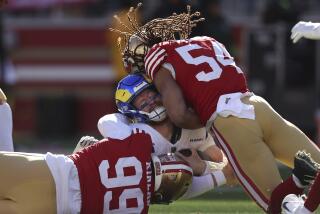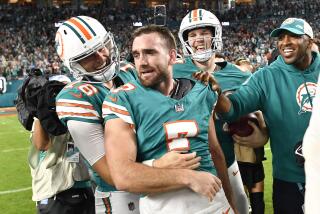Redskins Fare Well in Finale
- Share via
WASHINGTON — For the last time on a Sunday afternoon, RFK Stadium rocked and rolled to the strains of “We hate Dallas!”
The possibility of a fairy-tale ending for the Washington Redskins at their home of 35 years was ruined last week when they were eliminated from the playoff race, and Dallas made it easy Sunday by playing its second-stringers. But the result was the best the home team could do under the circumstances: a 37-10 rout of the archrival Cowboys (10-6).
“There’s no way to really make anything better in terms of not making the playoffs,” said cornerback Darrell Green, one of 32 current and former stars introduced in special halftime ceremonies. “But this is the best you can get. You end up winning nine; you finish in RFK beating the Cowboys. If I can’t get what I want, I’ll take this any day of the week.”
The win matched the Redskins’ biggest margin of victory over their fiercest rival, equaling a 41-14 blowout in 1986. The 56,454 fans spent the fourth quarter serenading their dislike of Cowboys, and, after the game, thousands overwhelmed police and invaded the field.
“I just wanted a piece of RFK,” said 14-year-old Jonah Ray, carrying a handful of sod.
For the record, the NFL’s tenure at what had become the smallest stadium in the league ended at 7:01 p.m., when Ken Harvey tackled Herschel Walker on the worn grass at the Dallas 45. The Redskins are moving into a 78,600-seat facility in Landover, Md.
Before the final snap, Terry Allen ran for three touchdowns and Scott Blanton kicked three field goals as the Redskins (9-7), whose second-half slide left them without a postseason berth despite a 7-1 start, salvaged a winning season for the first time since 1992.
Individual consolation prizes went to Allen, who broke John Riggins’ team single-season rushing mark; Henry Ellard, who moved past Steve Largent into third place on the league’s career receiving list; and Brian Mitchell, who became only the third player in NFL history to lead the league in combined net yards for three consecutive seasons. Jim Brown (1958-61) and Gale Sayers (1965-67) are the other players to accomplish the feat.
More to Read
Go beyond the scoreboard
Get the latest on L.A.'s teams in the daily Sports Report newsletter.
You may occasionally receive promotional content from the Los Angeles Times.










